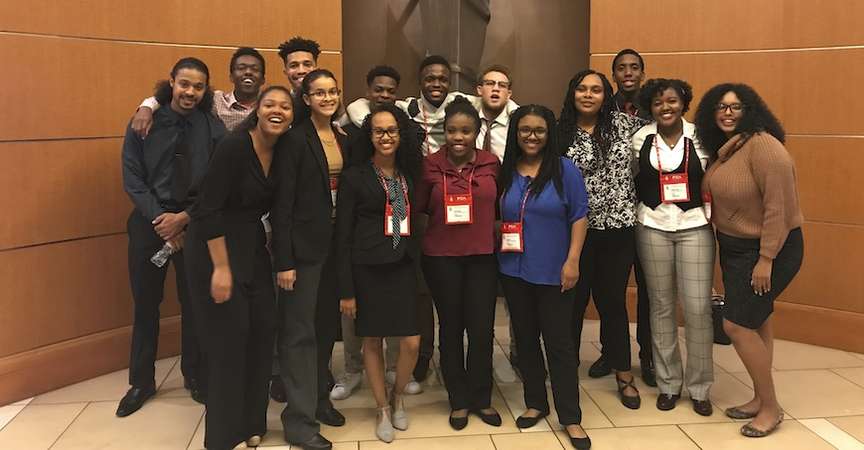
Science, technology, engineering and math (STEM) fields are particularly rigorous and demanding courses of study, and the difficulty for individuals pursuing degrees in these areas can be compounded when a student is part of an underrepresented or minority group.
For many UC Merced students facing these challenges, the National Society of Black Engineers (NSBE) has served as an important resource, providing support, guidance and advocacy throughout the scholars' time on campus and beyond.
Established at UC Merced in 2007, the NSBE is one of the university's earliest and most active student groups. It also benefits tremendously from alumni participation. Focused on providing opportunities for professional and academic development, encouraging cultural responsibility and positively impacting the community, the Merced chapter of the national organization also seeks to meet the unique needs of its home campus by contributing to its growth and promoting engineering throughout the region.
“NSBE demonstrates not only to member students that they have a strong support system and family unit to help them become culturally responsible engineers and scientists, but also illustrates the positive impact these strong, diverse minds and voices contribute to elevating the campus community as a whole,” said School of Engineering Personnel Services Director Tomiko Hale, who has served as the NSBE advisor since the organization was first established on campus 15 years ago.
"NSBE at UC Merced's founding members provided a place of refuge when I was a lost freshman, believing that I could step up to leadership and make a difference," said Jamie Sweet (BS '14), a UC Merced Alumni Association board member and former NSBE president who is currently a civil engineer at the East Bay Municipal Utility District. "This organization gave me confidence in and outside the classroom. It provided me a place to be with other students like me — Black, studying a difficult major and trying to make a difference — so I didn't feel alone."
"It's not just me," she added. "Ask almost any UC Merced NSBE alumni to help or give back…and they will say, 'yes.'"
NSBE alumni support for both the organization and UC Merced has included engaging with current engineering students as part of Engineers Week and participating in the university's first Student Philanthropy month through a crowdfunding initiative to raise money for an NSBE student-led, engineering competition project. As a result of that effort, the NSBE was the first to reach its fundraising goal, surpassing the original target by 50 percent.
Bryan Huffman (BS '14), a UC Merced graduate and current principal test engineer at Collins Aerospace, was one of the leading contributors to the NSBE crowdfunding project. He credits his career and academic achievements to the student organization.
"I would not have made it to where I am without the NSBE," he said. "I support them because they supported me, and — more importantly — inspired me. I would like those who come after me at UC Merced to support the organization, too, and I feel that leading by example will hopefully inspire them to pay it forward."
Hale believes that the active engagement of NSBE alumni – whether through mentorship, advocacy or donations – are vital to the organization’s ability to support and inspire current engineering students. “The fact that the alumni continue to contribute through their service, volunteerism and philanthropy demonstrates their desire to continue to serve NSBE’s mission,” she said. “There is an African American proverb, ‘Each one, teach one,’ and our NSBE alumni exemplify this to the fullest.”
Hale’s observations throughout her long tenure as NSBE advisor, along with Sweet and Huffman’s personal experiences, reflect the impact the NSBE can have on a Black engineering student's ability to persevere and succeed. According to the Pew Research Center, the long-term outlook for diversity in the STEM workforce is directly correlated to representation in STEM higher education. Black and Hispanic workers continue to be underrepresented in the STEM professions, with Black workers accounting for 9 percent of the STEM workforce, compared with 11 percent across all occupations, and representing just 5 percent of all engineers.
The Pew Center's analysis also indicates that a majority of Black Americans believe that seeing more examples of Black high achievers in the STEM fields will help encourage more young Black students to pursue degrees in engineering and the hard sciences.
Sweet hopes UC Merced will one day develop a resource to connect students with alumni, providing a direct link to professionals and high achievers in the STEM fields.
"My vision is to have a plethora of Black alumni who have graduated in every STEM major offered at UC Merced and to create a network/database specifically for this alumni group so current students can reach out for mentorship and guidance," she said.
"I dream of a system that doesn't need to differentiate support for Black STEM students, but I understand we are unfortunately still a long way from that being a reality," Huffman said. "So, for now, my hope and vision are that we are at least afforded the same opportunities. Without the NSBE, many Black — and even non-Black — STEM students would not be where they are today."






